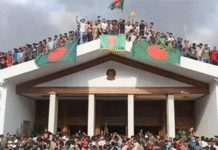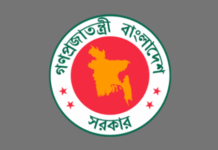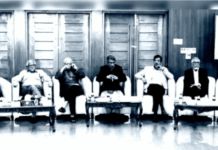
Abdus Subhan, a senior leader of Jamaat-e-Islami, has been sentenced to death for crimes against humanity during the 1971 Liberation War.
The three-member International Crimes Tribunal 2, led by Justice Obaidul Hassan, found him guilty on six charges out of nine.
Currently a vice president of the Islamist organisation, Subhan, was sentenced to hang on three charges that include abduction, loot, arson and murder.
The tribunal sentenced Subhan to imprisonment till death for two charges and 5 years in prison for another. But the three charges, the tribunal said, would merge into one sentence of death.
The Jamaat policymaker was acquitted in the three remaining charges.
Earlier in the day, the Jamaat leader was produced at the trial dock at 11am while the War Crimes Tribunal 2 started reading out a summary of 165-page verdict in the case at 11:15am.
Subhan was accused in 1972 by a special tribunal for collaborating with the Pakistani occupation forces and summoned. But he had already fled to Pakistan with former Jamaat chief Ghulam Azam, according to the prosecution.
The three-member tribunal, led by its Chairman, Justice Obaidul Hassan, fixed the date of verdict on Tuesday.
The incumbent nayeb-e-ameer (vice-president) of Jamaat Subhan, 77, is facing nine charges of crimes against humanity including genocide and murder of unarmed people, mainly Hindus, along with looting and setting houses on fire in Pabna during the 1971 Liberation War.
The charges are based on separate incidents taken place between April 13 and October 30 in which about 450 unarmed people were killed.
Son of Sheikh Naimuddin and Nurani Begum of Tailakundi village of Sujanagar upazila in Pabna, Subhan in 1971 was the founding ameer of Pabna unit Jamaat and Majlish-e-Sura member of the erstwhile United Pakistan Jamaat.
As the war began, Subhan was made general secretary of Pabna unit Peace Committee and later promoted to vice-chairman post of the associated body of the Pakistani Army.
He was elected unopposed a member of the National Assembly of Pakistan in late 1971. He resumed political career after the assassination of Bangabandhu Sheikh Mujibur Rahman in 1975.
In 2001, Subhan became a member of parliament from Pabna 5 constituency when the BNP-Jamaat-led four-party alliance came to power.
Law enforcers arrested Subhan on September 20, 2012. The tribunal 1 indicted the alleged war criminal on December 31, 2013. The case was later shifted to the tribunal 2 for quick disposal.
The prosecution placed 31 witnesses to testify against Subhan while none gave deposition defending the Jamaat leader. However, the tribunal had allowed three witnesses for him and the defence first said they would place two people.
First prosecution witness ATM Shahiduzzaman Nasim, then a secretary of the Bangladesh Students’ Union in Ishwardi, in his deposition told the tribunal that addressing a war criminal as a “Maulana” (religious scholar) was a sin.
Third witness Md Abu Asad claimed that he had been forced to join Mujaheed Bahini – a group of collaborators forced by Subhan and the Pakistani occupation forces.
“The accused [Subhan] took us to the army camp near the Hardinge Bridge in Ishwardi and said ‘I am Subhan from Pabna. As a Muslim, like me, you have to protect East Pakistan from today. If anyone tries to ignore this directive, he will be shot dead,’” the witness told the tribunal.
Asad also said he had witnessed many rapes. “I saw how the collaborators violated a woman in front of her husband and shot her dead. We used to encircle the villages at the time of atrocities so that none of the villagers could escape the place.”
Showing wounded spots on his body before the tribunal, fourth prosecution witness Rustam Ali alleged that it was the Jamaat leader who had shot him twice during the war. “Subhan was like an Azrail [angel of death in Muslim theology] and robber to us. I have been passing an uncomfortable life physically only because of him.”
Abdul Baten, the 25th prosecution witness, told the tribunal that Subhan had helped the Pakistani Army men to identify the Hindus in Sujanagar and asked to kill them for supporting the country’s independence.
Source: Dhaka Tribune









